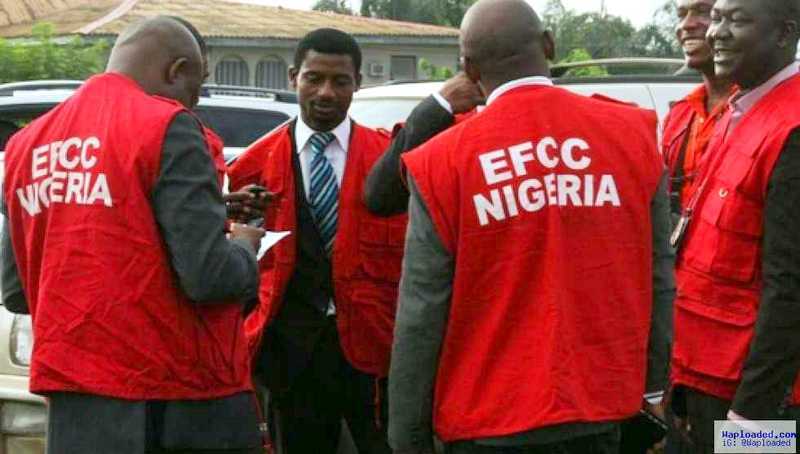Crime & Law
Alleged fraud: EFCC witness reveals how intelligence report sparked investigation into ex-NSA Dasuki

A prosecution witness on Tuesday told the FCT High Court in Abuja how an intelligence report triggered the Economic and Financial Crimes Commission (EFCC)’s investigation into former National Security Adviser (NSA) Sambo Dasuki and others over alleged diversion of arms funds.
The witness, Adariku Michael, an EFCC detective, stated that the commission received the report on 21 September 2015, which contained allegations of money laundering and abuse of office.
According to Michael, the intelligence prompted a thorough probe that eventually formed the basis of the high-profile corruption case against Dasuki and several associates.
Mr Michael also said the Office of the National Security Adviser (ONSA), which Mr Dasuki headed as the NSA between 2012 and 2015 during the administration of then-President Goodluck Jonathan, diverted huge amounts of money between October 2014 and April 2015 to various companies.
The anti-graft agency is prosecuting Mr Dasuki, a retired colonel, alongside a former General Manager at the Nigerian National Petroleum Corporation (NNPC), Aminu Baba-Kusa; Acacia Holdings Limited and Reliance Referral Hospital Limited on 32 counts of fraud involving diversion of 33.2 billion arms funds entrusted to the NSA office.
In March, the EFCC re-arraigned the defendants on criminal breach of trust, among other charges.
The rearraignment followed the reassignment of the case that started in 2015 to a new judge, Charles Agbaza.
The defendants denied all charges as they did when they were first arraigned in 2015.
Defence’s objection cuts short testimony
Led in evidence by prosecution lawyer Oluwaleke Atolagbe, EFCC detective Mr Michael told the court that he was part of the commission’s team of special task force.
According to him, the team led by Halimah Kazeem, an officer of the EFCC, was assigned to crack the intelligence received about the alleged diversion of funds entrusted in ONSA’s care.
“I got to know about this case when the commission (EFCC) received an intelligence report on 21 September 2015 bordering on abuse of office and money laundering, alleging that the Office of the National Security Adviser had moved a huge sum of money between October 2014 and April 2015 to the accounts of various companies,” he said.
On receiving the report, he said, the team wrote a letter of investigation to the Central Bank of Nigeria (CBN).
It was at this point that of the prosecution witness’ testimony that Mr Baba-Kusa’s defence lawyer, Solomon Umoh, a Senior Advocate of Nigeria (SAN), raised an objection.
Mr Umoh informed the court that Mr Michael was not listed on the list of witnesses served to the defence team by the prosecution.
He said the failure to include Mr Michael in the list of prosecution witnesses frontloaded to the defence was a violation of section 379 of the Administration of Criminal Justice Act (ACJA).
However, the EFCC’s lawyer, Mr Atolagbe, told the court that it was not the first time the witness had given evidence in the case.
Mr Atolagbe said Mr Michael had testified in the case while the current FCT Chief Judge, Hussein Baba-Yusuf, was overseeing the case.
He further stated that the prosecution tendered multiple documents as exhibits through.
Mr Atolagbe requested an adjournment to allow the prosecution do the needful.
The judge adjourned the case until 31 October.
Mr Dasuki and his co-defendant have stood trial in twin cases of diversion of various sums of funds from ONSA before the FCT High Court.
Both cases, with chequered history, have gone on in court with little progress for about 10 years.
Mr Atolagbe said Mr Michael had testified in the trial while the current FCT High Court Chief Judge, Hussein Baba-Yusuf, was overseeing the case.
He further said the prosecution had tendered multiple documents as exhibits through the same witness before the previous judge.
The trial, now before the new trial judge, Mr Agbaza, was stalled after the prosecution presented only one witness.
Also in 2015, the EFCC filed a separate case against Mr Dasuki. He was charged alongside former Minister of State for Finance, Bashir Yuguda; former Sokoto State Governor, Attahiru Bafarawa; his son, Sagir Bafarawa; and their company, Dalhatu Investment Limited.
They were accused of criminal breach of trust and misappropriation of N19.4 billion.
The case also suffered several adjournments. It is currently before another FCT High Court judge, Yusuf Halilu.
These trials suffered multiple adjournments in their early years, largely due to the State Security Services (SSS) refusing to release Mr Dasuki on bail despite multiple court orders.
The cases are part of Nigeria’s longest-running high-profile corruption trials, reflecting systemic delays in the country’s judicial system.
Mr Dasuki served as NSA between 2012 and 2015, at the height of Boko Haram attacks in Nigeria’s North-east, during the administration of then-President Goodluck Jonathan.
An audit panel set up by the administration of President Muhammadu Buhari, who came to office after defeating Mr Jonathan in the 2015 presidential election, revealed that about $2 billion entrusted in the office of the NSA, then led by Mr Dasuki, for procurement of arms could not be accounted for.
The EFCC, which instituted multiple charges against diverse persons who received funds from the NSA office, alleged that the arms funds were doled out to friends, relatives, political allies, particularly members of the then-ruling Peoples Democratic Party (PDP), for purposes unrelated to the purchase of arms.
(PremiumTimes)





















